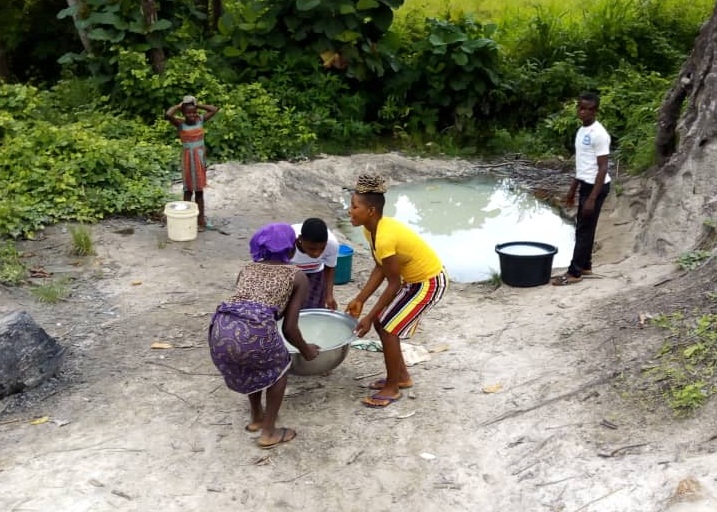Open Defecation: ’How we eat, drink our faeces’ without knowing

The health implication of open defecation is dreadful and has continued to pose danger to the lives of millions of helpless citizens not only in Nigeria but also in most parts of African continent due to lack of potable water, poor basic toilets facilities and poor sanitation.
In this report, DOOSUUR IWAMBE examines the attitude of some Nigerians who in most cases defecate in open spaces and streams that serves as their sources of drinking water without recourse to the environmental and health consequences.
The practice of open defecation is a global development and health issue facing developing nations. It is an ancient practice where people excrete in bushes, rivers, lakes, streams and other open spaces outside the designated toilets.
This can occur deliberately due to unwholesome cultural practices, superstitions, and personal unhygienic behaviours. It could also be as a result of unavailable or lack of access to modern toilet facilities.
While some communities go through this practice due to lack of basic social amenities, some rural communities tie this practice to their culture and tradition, hence making it a big challenge to overcome.
The United Nations had in 2010 declared access to safe drinking water and sanitation, a basic human right but this is not yet enforced in Nigeria.
For example, Pika like many other communities in Nigeria, practising open defecation is a community in Benue state ravaged by poverty and all forms of environmental and economic retardation.
It is a community where the practice of open defecation is view as a normal practice. Located about a few miles away from Makurdi, Mbatiav, Gboko local government area, life for the people of Pika is apparently pathetic.
Like many other disadvantaged communities in Benue State where the presence of government is not felt in any way, the people have for many years relied on well and the stream water for their subsistence life.
The women in the communities have to struggle daily walking long distances to the stream to fetch water for drinking, cooking and other household use.
Most importantly, lack of potable water has posed many health challenges to the people in rural areas in the state, as children and even adults have contracted water-borne diseases such as cholera, diarrhoea and typhoid fever among others due to the common practice of open defecation.
The people of the community depend on the local stream as their only source of water, filling an all-purpose gap, from bathing, laundry, cooking and drinking – without any form of purification.
On average, women and young children in Pika community have to visit the stream six to seven times daily. Sadly, the residential area is quite distant to the stream.
Left with no alternative, day and night, people have to pass through bush paths to scoop the oily, dirty, coloured and smelling water from the stream to meet their basic domestic needs.
Speaking with the Daily Times, a Roman Catholic priest, Rev. Fr. Dennis Ortese Yiyeh CSSp, who also resides in the community, said that water poverty has posed a threat to the people of the community leaving them with no other alternative but to defecate in the open.
“The children have to wake very early and trek down to the river every day. In a few cases, some children get injured in the process. It is important to fetch this water before going to school because their parents depend on them.
‘’On average, women and young children have to visit the stream six-seven times daily. The water from the river smells sometimes because the common practice here is open defecation and when it misted; the water washes the faeces back to the stream that serves the community.
‘’Sadly, that is how we eat and drink our faeces. Some of us are aware of the health implications of this but since there is no other alternative, we use the water like that’’, he said.
Another resident, 18-year-old Sewuese Ioranongu, who was shy to open up to our correspondent said that she has grown used to the practice of open defecation because that is what she grew up to know hence it is the common practice in the community.
‘’ I was born in this community and Makurdi is the farthest place I have ever been to. We do not have enough toilets here because our parents do not have the money to build luxury toilets. Open defecation is a traditional practice here. We no longer see it as a bad thing.
‘’Aside that, as you can see for yourself, there is no source of good water in this village. The well we used was dug by a good Samaritan several years ago and once dry season set in, it dries up.
We all depend on the small stream, which is a little bit far from here for our daily chores. Even if we have standard toilets, the likelihood of keeping it clean is not there since the water to do so is not enough’’, she said.
Nigeria’s age-old culture of open defecation has stubbornly held sway in many parts of the country, in spite of the rapid urbanisation being witnessed across the land.
It is a mark of bad governance that a practice that should rightly belong to the past is still in the ascendancy, despite the havoc it wreaks on the society.
Describing open defecation as a mark of underdevelopment would be stating the obvious. Yet, as backward as it may seem, open defecation is sadly not limited to rural communities alone but is also widely practised in urban areas – where many slums have sprung up and people tend to build houses with no thought for the provision of adequate sanitation or toilet facilities.
According to 80-year-old Alhaja Suliat Ogunbola, one of the oldest traders at Ogbere Idi Osan Market in Ona Ara Local Government Area of Oyo State, she, like the other women in the market, would love to use the market toilet facilities but for fear of infection, they resort to their old ways of open defecation.
“Who does not want to use a decent toilet? Let the government provide a more decent one and make sure there is water supply to prevent us from contracting disease while trying to defecate.
Don’t forget we are women and could easily contract diseases from dilapidated toilets. Some of us urinate anywhere we can find a space and with that, we can get infected in the process’’.
Speaking with the Daily Times during a visit to the market, the traders called on Oyo State government to come to their aid by building more toilets for them in the market.
“There is the need for more toilets to be built to cater for our needs and that of our customers and I think this has been a major challenge for us,” Mercy Orimolade who equally lamented scarcity of water for usage in the available toilets, said.
She added that for fear of infection, she usually use a bowl instead of sitting directly on the toilet. ”I find this routine very tough to do at my age but it is still better for me than to risk my health’’.
Thomas pev, a computer expert attributed the habit of ODF to the poor housing scheme in Nigeria. “If Nigerians have access to decent housing, no one will think of defecating in the open,” he said.

“Though I have not lived in a house without toilet facility, I have practiced open defecation just to have a feel of it.”
Raphael Adejoh, a student with Nasarawa State University on a visit to Abuja says in his opinion the practice can be stopped by strict compliance to metropolitan codes and this can be achieved through ‘campaign for attitude and behaviourial change.
“Home owners must incorporate functional toilet facilities in their houses,” he said.
Adejoh added that if government can criminalise open defecation, it will further force behavior and attitude change, but this he added can be enforced when provisions for public and mobile toilets have been made.
Ending open defecation by 2025: Is Nigeria reedy?
According to the 2018 WASH National Outcome Routine Mapping, World Health Organisation/UNICEF Joint Monitoring Programme for Water Supply and Sanitation Survey, Nigeria’s current delivery of improved toilet is approximately pegged at 160,000 per year.
The implication of this, according to the survey, is that one out of every four children under five years of age, would exhibit severe stunting, while one in 10, would be wasted, due to frequent episodes of diarrhoea and other WASH related illnesses.
If Nigeria can add two million toilets per year between 2019 and 2025, the target of Universal Basic Sanitation would be achieved, thereby saving the country N455 billion, representing 1.3 per cent of its GDP that is lost to poor sanitation, the survey stated.
UNICEF WASH specialist, Bioye Ogunjobi, at a media dialogue on Sanitation, Clean Nigeria: Use the Toilet Campaign sponsored by European Union and UKaid in collaboration with UNICEF, in Oyo state said that 1,020 children die in Nigeria from diseases caused by poor sanitation.
Ogunjobi said that about 47 million Nigerians, representing 24.4 per cent of the population still do open defecation and that 32 million people in Nigeria are still using unimproved toilet. “Almost 80 million people need support of an improved latrine/toilet,” he added.
According to Ogunjobi, while 10.3 per cent of people living in North-West Nigeria practice open defecation another 17.9 per cent of people living in South-South also practice open defecation.
‘’21.8 per cent of people living in North East practice open defecation; 53.9 per cent living in North-Central practice open defecation; 22.4 per cent of people living in South East practice open defecation and 28.0 per cent of people living in South West practice open defecation’’.
While one out of four Nigerians practice open defecation, Ogunjobi said in the North Central, it is one out of two persons. He added that only 13 out of the 774 local government areas in Nigeria are certified open defecation free.
He however urged the government to increase sanitation budgetary allocation while the private sector would compliment government’s efforts in curbing open defecation.
Even though the Nigerian government has reiterated its commitment to make the country open defecation by 2025, most Nigerians believe the leaders need do more in order to achieve this tall dream.
It could be recalled that the Federal government had approved the inauguration of a national campaign as part of efforts toward making the country free from open defecation by 2025.

According to the former Minister of Water Resources Suleiman Adamu the government had approved funds which would be sourced from annual budgetary allocation and grants from development partners to promote the national campaign tagged “Clean Nigeria, Use The Toilet.”
How flies’ perch on fasces, carry some amount to your food – Doctors
According to Dr Towoju Olumunyiwa, a Medical Practitioner, who advised Nigerians to adopt good hygiene and stop open defecation, open defecation had become a worrisome practice in Nigeria.
He said that bad habit is a major cause of many water-borne, food-borne and environmental diseases adding that it could also lead to outbreaks of diarrhoea, cholera, typhoid and dysentery.
The medical practitioner said that this practice was polluting the soil, water resources, environment and the air. “People defecate on the walk ways, under the bridges and at any available space.
That gives room for the spread of diseases; because when people defecate in the open, there is every tendency that flies will feed on these faeces.
“Flies perch on faeces and the fly carries away some amount of the faeces on their bodies. In addition, the flies perch on food, which may later be eaten by another person.
The germs in the faeces are passed onto the food. There is need for people to build toilets in their houses to maintain proper hygiene’’, he said.
Also, Dr. Bola Badmus of Wuse General Hospital Abuja said that life without a toilet is more than an inconvenience.
According to her, open defecation increases the incidents of diarrhea, cholera, malnutrition, and more, raising the rates of stunting, disease, and death. ‘’That, in turn, affects everything from productivity to economic growth.
‘’There is also need for people to attune themselves to modern practices and desist from ODF because as we have noticed, even where toilets are provided, some people either because of ignorance or cultural background, believe that ODF is healthier or more convenient for them.
“It is wrong to defecate in the open because it has a lot of consequences.”
She stressed the need to engage in public awareness campaigns by going round to educate owners of public buildings like plazas, shopping malls as well as filling stations on the need to ensure they have toilet facilities and ensure these facilities are open to the public.
Nigeria loses about N455bn of GDP to poor sanitation annually – Survey
Nigeria is losing a whopping sum of N455 billion out of N143,213,450,337.56 trillion ($397,270,000), representing 1.3 per cent of its gross domestic product (GDP) annually, due to poor sanitation and a third of that cost to open defecation, a survey has revealed.
This according to reports constitutes one per cent of Nigeria’s GDP. Open defecation costs Nigeria over $1bn a year, the GDP of Gambia. Losses are due to premature deaths, health-care costs, and reduced time and productivity.
The survey added that if Nigeria loses N455bn each year due to the lack of sanitation and needs only N95.9bn per year to eliminate open defecation, the economic gains could be about $1.026bn (N359.1bn) each year.







